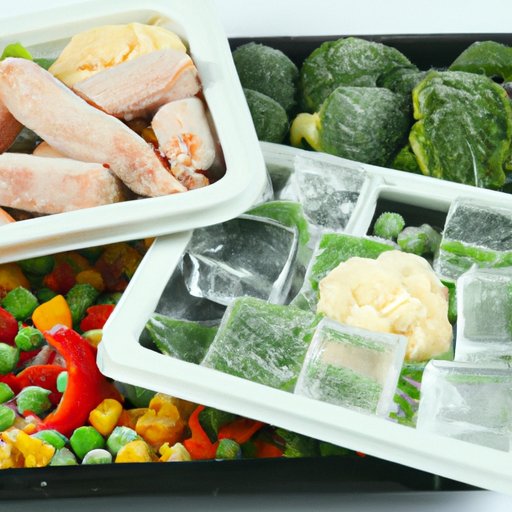Introduction
Frozen food is a convenient option for busy individuals looking for nutritious meals without spending too much time in the kitchen. It is food that has been processed and packaged before being frozen and stored at very low temperatures. Despite its convenience, many people are uncertain about the healthiness of frozen food. Is it really a good choice for those who want to maintain a healthy diet? In this article, we’ll explore the nutritional content, health benefits, safety, and environmental impact of frozen foods, so you can make an informed decision about whether they should be part of your diet.

Exploring the Health Benefits of Frozen Foods
Frozen foods have come a long way in recent years, with many brands offering healthier options than ever before. The nutritional content of frozen foods largely depends on the specific product, but many contain a variety of vitamins and minerals that can benefit your health. For example, frozen fruits and vegetables often contain high levels of antioxidants, which can help protect your cells from damage caused by free radicals.
Frozen foods also tend to be lower in calories and fat than their fresh counterparts, which makes them an excellent choice for those looking to lose weight or maintain a healthy weight. They also provide a convenient source of fiber, which is important for digestive health. Additionally, many frozen foods are fortified with essential vitamins and minerals, such as vitamin A, vitamin C, calcium, and iron.
Analyzing the Nutritional Content of Frozen Foods
Frozen foods typically contain macronutrients like carbohydrates, proteins, and fats, as well as micronutrients like vitamins and minerals. When comparing fresh and frozen foods, it’s important to note that some nutrients may be lost during the freezing process. For example, some vitamins and minerals, such as vitamin C and folate, are sensitive to heat and light and can be destroyed during the freezing process.
However, some studies have shown that frozen foods can actually retain more nutrients than fresh foods due to the fact that they are usually frozen at their peak ripeness. This means that frozen fruits and vegetables can sometimes be more nutritious than their fresh counterparts. Additionally, many frozen foods are enriched or fortified with additional vitamins and minerals, which can help boost their nutritional content.

Examining the Safety and Quality of Frozen Foods
When purchasing frozen foods, it’s important to ensure that they have been handled and stored properly. If the packaging is damaged or the food has been exposed to temperatures above freezing, there is a risk of contamination. Additionally, some frozen foods may contain additives or preservatives, which can be unhealthy if consumed in large quantities.
It’s also important to read the labels carefully to ensure that the product does not contain any ingredients that you may be allergic to. Finally, always check the expiration date before purchasing frozen foods to ensure that they are still safe to eat.
Understanding the Pros and Cons of Eating Frozen Foods
Eating frozen foods can offer several advantages. They are often more affordable than fresh foods, and they can last for months in the freezer. Additionally, frozen foods are easy to prepare and can save time in the kitchen. They can also provide a convenient source of nutrition when fresh fruits and vegetables are not available.
On the other hand, frozen foods can also have some drawbacks. Many brands are high in sodium, sugar, and unhealthy fats, which can increase your risk of chronic diseases. Additionally, some frozen foods may contain additives or preservatives that can be unhealthy if consumed in large quantities.

Investigating the Environmental Impact of Frozen Foods
The production, transport, and storage of frozen foods can have a significant environmental impact. The energy required to keep frozen foods cold during transport and storage can be considerable, and the packaging used for frozen foods can generate a lot of waste. Additionally, when frozen foods are disposed of, they can release methane into the atmosphere, which is a potent greenhouse gas.
Investigating the Cost-Effectiveness of Frozen Foods
The cost-effectiveness of frozen foods will depend on a variety of factors, including the type of food, brand, and size of the package. Generally speaking, frozen foods tend to be cheaper than fresh foods, since they do not require as much preparation or spoil as quickly. However, it’s important to compare prices between brands and sizes to make sure you’re getting the best deal.
Conclusion
Frozen foods can be a convenient and cost-effective way to get the nutrients you need while saving time in the kitchen. They are generally lower in calories and fat than their fresh counterparts, and many are enriched or fortified with additional vitamins and minerals. However, it’s important to read labels carefully and check for possible contaminants or allergens. Additionally, the production, transport, and storage of frozen foods can have a significant environmental impact, so it’s important to consider these factors when making your food choices.
Overall, frozen foods can be a healthy and convenient option for those who want to maintain a balanced diet while saving time and money. With careful selection and proper storage, frozen foods can be a nutritious and cost-effective addition to your diet.
(Note: Is this article not meeting your expectations? Do you have knowledge or insights to share? Unlock new opportunities and expand your reach by joining our authors team. Click Registration to join us and share your expertise with our readers.)
